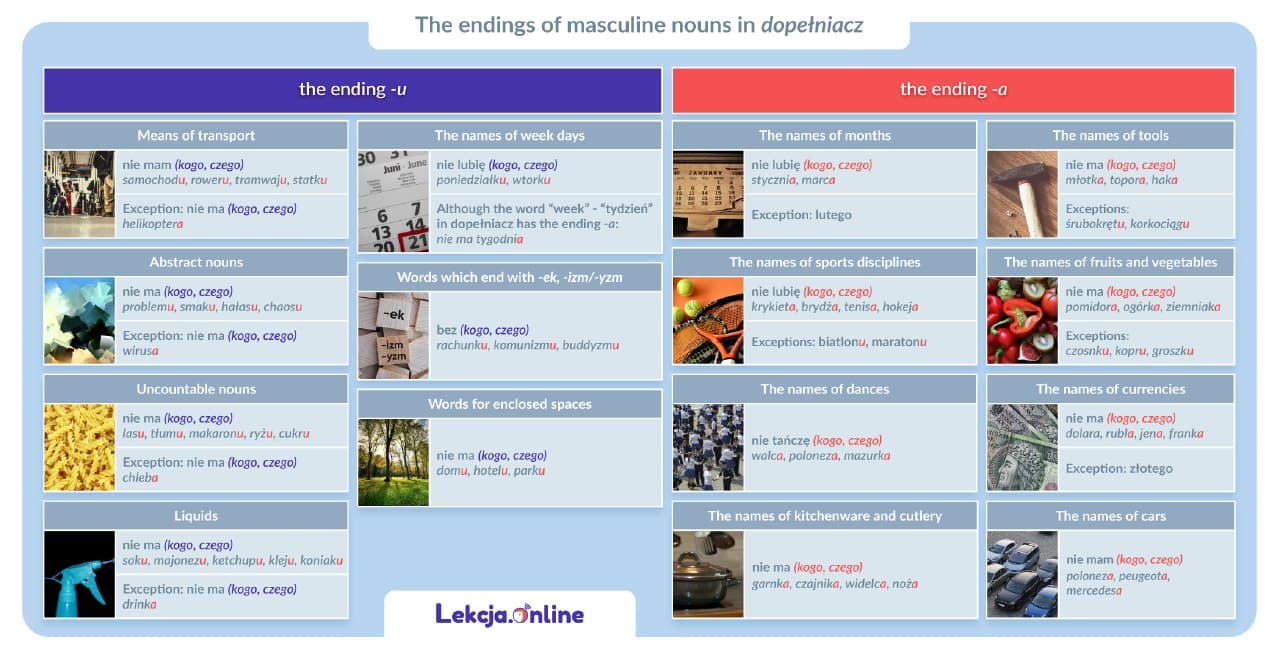Let’s admit from the very beginning: dopełniacz is probably one of the most difficult topics Polish grammar. It has a lot of different rules and even more exceptions to them, and to make matters worse, we use it in almost every sentence.
So, let’s try to make it a bit easier for you to organise all these rules once and for all.
Masculine singular nouns
We can say that it consists of one rule and endless exceptions to it. The rule is that masculine singular nouns have two possible endings: -a, -u.
We can try to define specific semantic groups which get one or the other ending, but that’s exactly where the exceptions start. For almost every group there will be exceptions, that’s a rule 
The practical approach here can be to either note down the endings for all the new words that you study or, which is even more advisable, just to practice as much as you can – in speaking, listening and reading.
But still, I believe it’s worth trying to name all these groups, since despite the exceptions they all show some regularity.
The groups of masculine nouns which end with an -u in dopełniacz:
- means of transport (nie mam samochodu, roweru, tramwaju, statku, BUT: helikoptera)
- abstract nouns (nie ma problemu, smaku, hałasu, chaosu BUT: wirusa)
- uncountable nouns (nie ma lasu, tłumu, makaronu, ryżu, cukru, BUT: chleba)
- liquids (bez soku, majonezu, ketchupu, kleju, koniaku, BUT: drinka)
- the names of week days (even though the word “week” – “tydzień” in dopełniacz has the ending -а: nie ma tygodnia)
- words which end with -ek, -izm/-yzm (bez rachunku, komunizmu, buddyzmu)
- words for enclosed spaces (dom – domu, hotel – hotelu, park – parku, rynek – rynku, bar – baru, apartament – apartamentu, sklep – sklepu, magazyn – magazynu,namiot-namiotu)
The groups of masculine nouns which end with an -a in dopełniacz:
- people and animals (nie ma profesora, nauczyciela, kota, psa)
- the names of months (stycznia, marca, lipca, grudnia, BUT: luty – lutego)
- the names of sports disciplines (nie lubię krykieta, brydża, tenisa, hokeja, BUT: nie oglądam biatlonu, maratonu)
- the names of dances (nie tańczę walca, poloneza, mazurka)
- the names of kitchenware and cutlery (nie ma garnka, czajnika, widelca, noża, BUT the words samowar, szybkowar have two possible endings: samowara/samowaru, szybkowara/szybkowaru)
- the names of tools (nie ma młotka, topora, haka, hebla, BUT: nie ma śrubokrętu, korkociągu)
- the names of fruits and vegetables (bez pomidora, ogórka, ziemniaka, banana, ananasa, arbuza BUT: bez czosnku, kopru, groszku)
- the names of currencies (bez dolara, rubla, jena, franka, ALE: złoty – złotego)
- the names of cars (nie mam poloneza, peugeota, mercedesa, forda, BUT you must remember that some cars’ names don’t change at all: nie mam renault, nie mam BMW)
- Polish cities, including those which were a part of the Polish-Lithuanian Commonwealth (do Krakowa, Lublina, Mińska, Wilna Wrocławia, Kijowa, BUT: Sopotu, Białegostoku), many Russian cities (Swierdłowska, Chabarowska, Saratowa, Irkutska, BUT: Syktywkaru, Władywostoku), and cities whose names end with -burg (z Hamburga, Petersburga, Edynburga)
- most of grammatical terms (rzeczownik-rzeczownika, mianownik-mianownika, BUT: przypadek-przypadku)
- words with the suffixes -ak, -nik (strażaka, ziemniaka, strażnika, opornika)

Please note that with masculine nouns with the suffix -ek (including diminutive forms of men’s names) the letter “e” disappears in dopełniacz as well as with biernik, celownik, narzędnik, miejscownik:
domek – domku, domkowi, domkiem, domku
garnek – garnka, garnkowi, garnkiem, garnku
zegarek – zegarka, zegarkowi, zegarkiem, zegarku
ogórek – ogórka, ogórkowi, ogórkiem, ogórku
Antek – Antka, Antkowi, Antkiem, Antku
Maciek – Maćka, Maćkowi, Maćkiem, Maćku
The same thing happens with many masculine nouns with the suffix -er and some (but not many) nouns with the suffix -el:
cukier – cukru, cukrowi, cukrem, cukrze
puder – pudru, pudrowi, pudrem, pudrze
plaster – plastru, plastrowi, plastrem, plastrze
bajzel – bajzlu, bajzlowi, bajzlem, bajzlu
wróbel – wróbla, wróblowi, wróblem, wróblu
In the group of nouns with the -er ending there are many exceptions, where the letter “e” doesn’t disappear:
fryzjer – fryzjera
lakier – lakieru
poker – pokera
papier – papieru
Feminine singular nouns
All the feminine nouns in which the root in mianownik ends with k, g, ś, ń, ć, ź, dź, l, j have the ending -i in dopełniacz with some possible alterations after soft letters ś, ń, ć, ź:
kolacja – kolacji
kość – kości
noga – nogi
Where the root ends with any other letter, feminine nouns have the ending -y in dopełniacz:
dizewczyna – dziewczyny
tablica – tablicy
kreda – kredy
Neuter singular nouns
All neuter singular nouns have only one ending in dopełniacz: -a
dziecko – dziecka
słońce – słońca
okno – okna
I wish you luck in memorising all the rules and exceptions!



